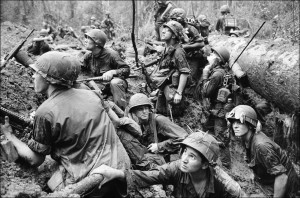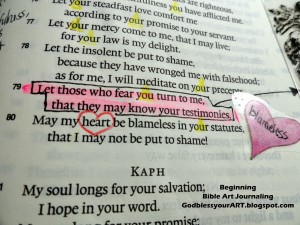Be exalted above the heavens, O God; let Your glory be above all the earth. (Psalm 57:5)
Last week I mentioned how context is critical to understanding and applying Scripture. I then showed the what the above verse was sandwiched in between:
 My soul is among lions; I must lie among those who breathe forth fire, even the sons of men, whose teeth are spears and arrows and their tongue a sharp sword. Be exalted above the heavens, O God; let Your glory be above all the earth. They have prepared a net for my steps; my soul is bowed down; They dug a pit before me. (vs. 4-6)
My soul is among lions; I must lie among those who breathe forth fire, even the sons of men, whose teeth are spears and arrows and their tongue a sharp sword. Be exalted above the heavens, O God; let Your glory be above all the earth. They have prepared a net for my steps; my soul is bowed down; They dug a pit before me. (vs. 4-6)
Now how is it that David could exalt the LORD in the midst of a dangerous and desperate position? The words of another Psalm give us some insight:
I praise God for what he has promised; yes, I praise the Lord for what he has promised. I trust in God, so why should I be afraid? What can mere mortals do to me? (Psalm 56:11-12)
If we truly do trust the LORD, then hopefully we can say along with David, “What can man do to me?” But I also said the last time, I wanted to go a little further—and I meant that literally. Here’s more context to the “exalted” passage.
They have prepared a net for my steps; my soul is bowed down; they dug a pit before me; they themselves have fallen into the midst of it.(vs. 6)
And what did we learn from the additional context? Deliverance! And David goes further:
My heart is steadfast, O God, my heart is steadfast; I will sing, yes, I will sing praises!
Awake, my glory! Awake, harp and lyre! I will awaken the dawn. I will give thanks to You, O Lord, among the peoples; I will sing praises to You among the nations. For Your lovingkindness is great to the heavens and Your truth to the clouds. Be exalted above the heavens, O God; Let Your glory be above all the earth. (vs. 7-11)
David recaps this verse at the end of the Psalm (there is no more) because he has been delivered; those who thought to do ill to him, fell into their own traps. He then breaks out into full-tilt praise to the LORD, all the way to the end. He sings praise because God answered His prayer; he sings praise because He is thankful.
The story ends well here, and David sings the Lord’s praise. But don’t forget, when he exalted the Lord the first time, he was still in the middle of it. So regardless of the context, of what’s going on around you, exalt the LORD. And should He deliver you, remember to be thankful. Job had it right as well, even when He was in the middle of it:
Then Job got up and tore his clothes in grief. He shaved his head and threw himself face downward on the ground. He said, “I was born with nothing, and I will die with nothing. The Lord gave, and now he has taken away. May his name be praised!” In spite of everything that had happened, Job did not sin by blaming God. (Job 1:20-22)

 Context is critical when it comes to determine the actual meaning of a scriptural passage, and how it is to be applied. I love getting wrapped up in individual words and their meanings and nuances, but if I lose sight of the context, then I commit a grave error as described in the idiom: “Can’t see the forest for the trees”, which reminds us that we need perspective, we need context.
Context is critical when it comes to determine the actual meaning of a scriptural passage, and how it is to be applied. I love getting wrapped up in individual words and their meanings and nuances, but if I lose sight of the context, then I commit a grave error as described in the idiom: “Can’t see the forest for the trees”, which reminds us that we need perspective, we need context. Wisdom. It’s not something that is typically sought out; for rare indeed are those who think it useful. But Scripture tells us otherwise:
Wisdom. It’s not something that is typically sought out; for rare indeed are those who think it useful. But Scripture tells us otherwise:
 Catching up, picking up; plans and conversations… gone. And it wasn’t just an reunion that was gone, a friend was gone. A daughter was gone. I don’t know how God gave me this verse, but it arrived in the midst of my grief. And I learned an indelible lesson on numbering my days. I learned to count each day, every day, every conversation, every person as precious, and that tomorrow (or several months hence) wasn’t promised.
Catching up, picking up; plans and conversations… gone. And it wasn’t just an reunion that was gone, a friend was gone. A daughter was gone. I don’t know how God gave me this verse, but it arrived in the midst of my grief. And I learned an indelible lesson on numbering my days. I learned to count each day, every day, every conversation, every person as precious, and that tomorrow (or several months hence) wasn’t promised. Or is it a gift from God? I pray that it would be the latter. One more day to experience His mercy, grace, and love. One more day to celebrate His creation. And one more day to walk with and embrace His people.
Or is it a gift from God? I pray that it would be the latter. One more day to experience His mercy, grace, and love. One more day to celebrate His creation. And one more day to walk with and embrace His people. Idols. Useless gods. Do you serve any useless gods? When God with His own finger wrote out the 10 Commandments for Moses, the first of them was: Do not worship any god except me. Do not make idols that look like anything in the sky or on earth or in the ocean under the earth. Don’t bow down and worship idols. I am the Lord your God, and I demand all your love. (Exodus 20:3-5)
Idols. Useless gods. Do you serve any useless gods? When God with His own finger wrote out the 10 Commandments for Moses, the first of them was: Do not worship any god except me. Do not make idols that look like anything in the sky or on earth or in the ocean under the earth. Don’t bow down and worship idols. I am the Lord your God, and I demand all your love. (Exodus 20:3-5) a mentor named Rick when I was at the Conservatory. He was a retired Baptist missionary, and was now on the payroll of a large hospital in the Central Valley as their chaplain. Whenever there was a difficult situation, Rick was called in to minister to the family, and help the patient to step into eternity to meet Jesus. There was this one old man who had just hours to live, and the hospital asked Rick to visit him. He had no family, he was alone, and Rick chose to sit and wait with him.
a mentor named Rick when I was at the Conservatory. He was a retired Baptist missionary, and was now on the payroll of a large hospital in the Central Valley as their chaplain. Whenever there was a difficult situation, Rick was called in to minister to the family, and help the patient to step into eternity to meet Jesus. There was this one old man who had just hours to live, and the hospital asked Rick to visit him. He had no family, he was alone, and Rick chose to sit and wait with him.